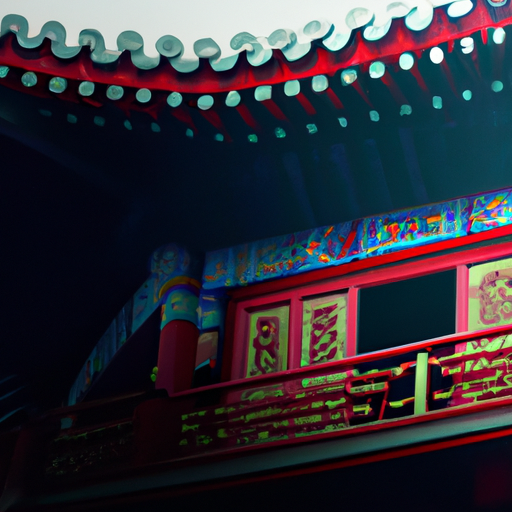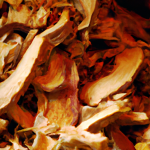The Role of Traditional Chinese Medicine (TCM) in Ancient Chinese Courts
Imperial Health: TCM in Ancient Chinese Courts
Traditional Chinese Medicine (TCM) has a rich history that dates back thousands of years. It has been an integral part of Chinese culture and society, and its influence can be seen in various aspects of life, including the ancient Chinese courts. In this article, we will explore the role of TCM in the courts of ancient China and how it contributed to the overall well-being of the imperial family and officials.
In ancient China, the imperial court was the center of power and authority. It was not only a political institution but also a cultural and social hub. The emperors and their families were considered the epitome of health and vitality, and TCM played a crucial role in maintaining their well-being. The imperial physicians, who were highly trained in the principles of TCM, were responsible for the health of the imperial family.
TCM was deeply rooted in the belief that the body is a complex system that needs to be in balance to achieve optimal health. It emphasized the importance of prevention and the use of natural remedies to treat illnesses. The imperial physicians used a combination of herbal medicine, acupuncture, and dietary therapy to maintain the health of the imperial family. They believed that by harmonizing the body’s energy, or qi, they could prevent and treat diseases.
One of the key principles of TCM is the concept of yin and yang, which represents the opposing forces in the universe. In the context of health, yin and yang represent the balance between the body’s internal organs and their functions. The imperial physicians used this principle to diagnose and treat illnesses. They believed that an imbalance of yin and yang could lead to disease, and by restoring the balance, they could restore health.
The imperial court also had a dedicated herbal pharmacy, where a vast array of medicinal herbs were stored. These herbs were carefully selected and prepared by the imperial physicians to create customized formulas for the imperial family. Each herb had its own unique properties and was used to treat specific ailments. The use of herbal medicine was not only limited to the imperial family but also extended to the officials and their families.
Acupuncture was another important component of TCM that was widely practiced in the ancient Chinese courts. It involved the insertion of thin needles into specific points on the body to stimulate the flow of qi and restore balance. Acupuncture was used to treat a wide range of conditions, including pain, digestive disorders, and emotional imbalances. The imperial physicians were skilled in the art of acupuncture and used it as a complementary therapy to herbal medicine.
In addition to herbal medicine and acupuncture, the imperial physicians also emphasized the importance of dietary therapy. They believed that food played a vital role in maintaining health and preventing diseases. The imperial family and officials were advised on the types of foods to consume based on their individual constitution and health conditions. Certain foods were believed to have specific healing properties and were incorporated into their daily diet.
The role of TCM in the ancient Chinese courts cannot be overstated. It was not only a system of medicine but also a way of life. The emphasis on prevention, natural remedies, and the holistic approach to health contributed to the overall well-being of the imperial family and officials. TCM continues to be an integral part of Chinese culture and is practiced and respected worldwide for its effectiveness and holistic approach to health.
Ancient Chinese Emperors and their Use of TCM for Health and Wellness

Imperial Health: TCM in Ancient Chinese Courts
Ancient Chinese Emperors and their Use of TCM for Health and Wellness
In the ancient Chinese courts, the emperors held a deep belief in the power of Traditional Chinese Medicine (TCM) for maintaining their health and wellness. TCM, with its holistic approach and emphasis on balance, was seen as a vital tool in ensuring the longevity and vitality of the emperors. Let’s delve into the fascinating world of TCM in ancient Chinese courts and explore how it played a significant role in the lives of the emperors.
The emperors of ancient China were not only political leaders but also revered as the embodiment of the divine. As such, their health was of utmost importance, not only for their personal well-being but also for the stability and prosperity of the entire empire. TCM, with its centuries-old wisdom and natural remedies, became an integral part of their daily lives.
One of the key principles of TCM is the concept of Qi, the vital energy that flows through the body. The emperors understood the importance of maintaining a harmonious flow of Qi to ensure good health. They would consult with highly skilled TCM practitioners who would carefully assess their Qi and prescribe treatments to restore balance whenever necessary.
Herbal medicine was a cornerstone of TCM in ancient Chinese courts. The emperors had access to a vast array of herbs and plants, carefully cultivated and selected for their medicinal properties. These herbs were used to create powerful concoctions that could address a wide range of health issues, from boosting the immune system to alleviating pain and promoting longevity.
Acupuncture, another pillar of TCM, was also widely used by the emperors. Thin needles were strategically inserted into specific points on the body to stimulate the flow of Qi and restore balance. This ancient practice was believed to have profound effects on the body and mind, promoting overall well-being and vitality.
In addition to herbal medicine and acupuncture, the emperors also embraced other TCM modalities such as moxibustion, cupping, and massage. Moxibustion involved burning dried mugwort near specific acupuncture points to warm and invigorate the body. Cupping, on the other hand, involved placing heated cups on the skin to create suction and promote blood flow. Massage, known as Tui Na, was used to manipulate the body’s energy channels and relieve tension.
The emperors’ commitment to TCM extended beyond their personal health. They actively supported the development of TCM theories and practices, encouraging research and the compilation of medical texts. These texts, such as the Huangdi Neijing (Yellow Emperor’s Inner Canon), became invaluable resources for future generations, preserving the knowledge and wisdom of TCM.
The use of TCM in ancient Chinese courts was not limited to physical health alone. Emperors recognized the profound connection between the body and mind and understood the importance of mental and emotional well-being. TCM offered a holistic approach to health, addressing not only physical ailments but also mental and emotional imbalances.
In conclusion, TCM played a vital role in the lives of ancient Chinese emperors, who saw it as a powerful tool for maintaining their health and wellness. From herbal medicine to acupuncture, moxibustion to cupping, the emperors embraced a wide range of TCM modalities to ensure the harmonious flow of Qi and promote balance in their bodies. Their commitment to TCM extended beyond their personal well-being, as they actively supported its development and preservation for future generations. Today, we can still draw inspiration from their belief in the power of TCM and its holistic approach to health and wellness.
Exploring the Influence of TCM on Imperial Health Practices in Ancient China
Imperial Health: TCM in Ancient Chinese Courts
In ancient China, the health and well-being of the imperial court were of utmost importance. The emperors and empresses were not only the rulers of the land but also the embodiment of the nation’s prosperity and stability. To maintain their health and vitality, the imperial court turned to Traditional Chinese Medicine (TCM), a holistic approach that has been practiced for thousands of years.
TCM is based on the belief that the body is a complex system of interconnected parts, and any imbalance in one area can affect the overall health. It encompasses various practices, including acupuncture, herbal medicine, dietary therapy, and exercise. These practices aim to restore the body’s natural balance and promote overall well-being.
In the ancient Chinese courts, TCM played a crucial role in maintaining the health of the emperors and empresses. The imperial physicians were highly skilled in the art of TCM and were responsible for the well-being of the entire court. They would carefully diagnose any ailments or imbalances and prescribe the appropriate treatments.
Acupuncture was one of the most commonly used TCM practices in the imperial court. Thin needles were inserted into specific points on the body to stimulate the flow of energy, known as Qi. This technique was believed to restore balance and alleviate pain or discomfort. The emperors and empresses would often receive acupuncture treatments to maintain their vitality and prevent any potential health issues.
Herbal medicine was another essential aspect of TCM in the imperial court. The imperial physicians would carefully select herbs and plants with specific healing properties to create customized formulas for the emperors and empresses. These formulas were designed to address their individual health needs and promote overall well-being. The use of herbal medicine was not only limited to treating illnesses but also as a preventive measure to maintain optimal health.
Dietary therapy was also an integral part of TCM in the ancient Chinese courts. The emperors and empresses would follow specific dietary guidelines to ensure they were consuming foods that would support their health. Certain foods were believed to have specific healing properties and were incorporated into their daily meals. For example, ginseng was highly valued for its rejuvenating effects, while goji berries were known for their immune-boosting properties.
In addition to these practices, exercise was also emphasized in the imperial court. The emperors and empresses would engage in various physical activities, such as tai chi and qigong, to promote circulation, flexibility, and overall vitality. These exercises were not only beneficial for their physical health but also for their mental well-being, as they helped reduce stress and promote relaxation.
The influence of TCM on imperial health practices in ancient China cannot be overstated. It was a comprehensive approach that addressed not only the physical but also the mental and spiritual aspects of health. The emperors and empresses were able to maintain their vitality and rule with strength and clarity, thanks to the wisdom of TCM.
Today, TCM continues to be practiced and valued worldwide for its holistic approach to health. Its principles and practices have stood the test of time and continue to offer valuable insights into maintaining well-being. As we explore the influence of TCM on imperial health practices in ancient China, we can appreciate the wisdom and effectiveness of this ancient healing system.

